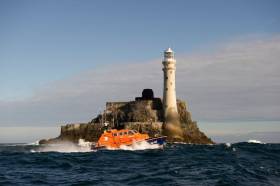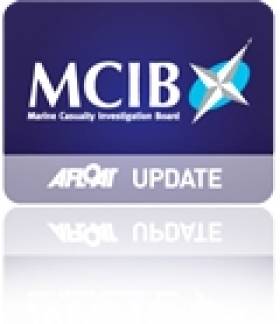Displaying items by tag: Drascombe Lugger
Baltimore Lifeboat Responds To Drascombe Lugger Mayday
#RNLI - Just hours after launching to an alarm from a yacht’s emergency beacon on Friday morning (28 July), Baltimore RNLI’s all-weather lifeboat was back in action responding to a Mayday from a Drascombe Lugger taking on water in Schull Harbour.
The lifeboat launched at 6.11pm and proceeded to the scene amid calm conditions at sea, with a westerly Force 4 wind and good visibility.
Before they arrived, however, Schull Coast Guard’s inshore rescue boat was first on scene six minutes later and took the sailing boat with two on board under tow back to Schull Harbour.
“The sailors did the right thing this evening and raised the alarm when they found themselves in difficulty,” said Kate Callanan, Baltimore RNLI volunteer lifeboat press officer.
“We would like to commend our colleagues in the Irish Coast Guard who arrived on scene and brought the vessel to safety.”
Lack Of Experience, Absence Of Radio & Stability Issues Compounded 'Zillah' Dinghy Tragedy - MCIB Report
#Zillah - Lack of seafaring experience and the absence of a VHF radio or other means of contact compounded a tragic situation that led to the death of a retired teacher after the capsize of his dinghy off West Cork last summer, according to the official investigation into the incident.
As previously reported on Afloat.ie, an inquest into the capsize of the Drascombe Lugger Zillah returned a verdict of accidental death in the case of 66-year-old Douglas Perrin, who drowned after his vessel overturned and sent him and two companions into the water off Castle Island near Schull on the evening of 13 August last.
The court heard that guests Marian Brown and Patrick Anwyl, neither experienced sailors, were taking turns at the helm under the supervision of Perrin, a sailing instructor for more some 30 years, when the boat overturned in gusty weather.
As the report by the Marine Casualty Investigation Board (MCIB) outlines, it was found that the boat - built before the Recreational Craft Directive requirement and of a type known to have stability issues in certain conditions – gybed suddenly on the approach to the Amelia Buoy at the Schull Harbour entrance, taking all three by surprise.
The vessel quickly turned turtle, with its centreplate retracting into the stowed position, and the guests managed to clamber onto the upturned hull with Perrin in the water beside them.
However, they did not have a VHF radio or EPIRB-type beacon on the vessel, and there were no other boats in the vicinity to witness the incident not spot the casualties and attempt rescue.
Despite the mild water temperature, none of the three were wearing more than light summer clothes with their PFDs, and Perrin spoke of feeling cold within 30 minutes.
After the three attempted to swim some 50 metres to nearby rocks on Castle Island, Perrin was separated from his guests, who later saw him drifting past the island making no effort to swim but with his head above the waves.
It was many hours later into the following day, after an alert by Perrin's wife who had been expecting the group's return, that Brown and Anwyl were located and rescued by emergency responders. The body of Perrin was found a short time later off Sherkin Island.
The MCIB found that the guests' lack of sailing experience "meant that they did not react correctly to the developing situation" when the boat suddenly gybed.
Moreover, the lack of a radio, which would have immediately alerted any number of vessels in the nearby Schull area as well as emergency teams, would have likely seen all three rescued in a matter of minutes.
It's also possible that had their PFDs been fitted with lights and whistles, the guests may have been spotted sooner by search and rescue crews.
The full report into the Zillah incident by the MCIB, including its safety recommendations, is available to download HERE.
Retired Teacher Drowned After Sailboat Overturned, Inquest Hears
#Zillah - The inquest into the death of a retired schoolteacher in a sailing accident off West Cork last summer has heard he was "very safety conscious".
As previously reported on Afloat.ie, the body of 66-year-old Douglas Perrin was recovered from the water near Sherkin Island on the morning of 14 August 2014 after a 12-hour search and rescue operation.
Coroner Frank O’Connell returned a verdict of accidental death, noting the cause of death as acute cardiac failure brought on by drowning.
Two companions, Marian Brown and Patrick Anwyl, were found alive on nearby Castle Island after swimming away from the capsized sailboat the three had been travelling in the day before.
Bandon Courthouse was told that Perrin had purchased his boat Zillah, a 24ft Drascombe Lugger, two years before retiring from Oxfordshire to Goleen in Co Cork in 2013, according to the Irish Examiner.
The party – each with a lifejacket – had set out for a short excursion at 4pm, planning to return in time for a 7pm dinner, when the boat overturned under the control of Anwyl in gusty weather.
"We were about 50 yards from an island, collectively we discussed it and started to swim," read a statement from Brown, who added that when the swell subsided, she and Anwyl managed to clamber onto the rocks, from where they saw Perrin "lying passively in the water, just drifting."
Later, Brown recalled an Irish Coast Guard helicopter sweeping the area with its search beam but failing to spot the pair, who were eventually met by crews from the Schull inshore lifeboat and Baltimore RNLI the following morning.
The Irish Examiner has more on the story HERE.































































